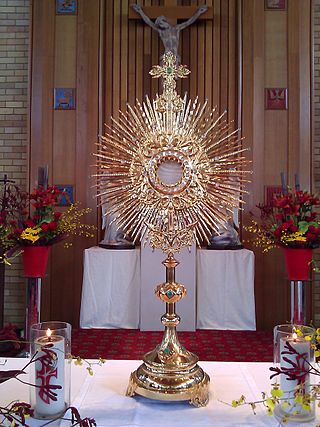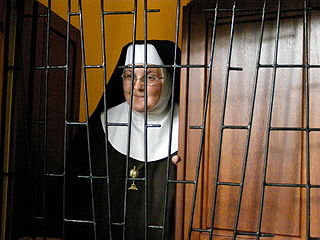Related Research Articles

The Order of Preachers, commonly known as the Dominican Order, is a Catholic mendicant order of pontifical right that was founded in France by a Castilian priest named Dominic de Guzmán. It was approved by Pope Honorius III via the papal bull Religiosam vitam on 22 December 1216. Members of the order, who are referred to as Dominicans, generally display the letters OP after their names, standing for Ordinis Praedicatorum, meaning 'of the Order of Preachers'. Membership in the order includes friars, nuns, active sisters, and lay or secular Dominicans. More recently, there have been a growing number of associates of the religious sisters who are unrelated to the tertiaries.

A nun is a woman who vows to dedicate her life to religious service and contemplation, typically living under vows of poverty, chastity, and obedience in the enclosure of a monastery or convent. The term is often used interchangeably with religious sisters who do take simple vows but live an active vocation of prayer and charitable work.

The Order of the Visitation of Holy Mary, abbreviated VSM and also known as the Visitandines, is a Catholic religious order of Pontifical Right for women. Members of the order are also known as the Salesian Sisters or, more commonly as the Visitation Sisters.

Eucharistic adoration is a devotional practice primarily in Western Catholicism and Western Rite Orthodoxy, but also to a lesser extent in certain Lutheran and Anglican traditions, in which the Blessed Sacrament is adored by the faithful. This practice may occur either when the Eucharist is exposed, or when it is not publicly viewable because it is reserved in a place such as a tabernacle.

The Monastery of Santa Catalina de Siena is a large monastery of the Dominican Second Order, located in Arequipa, Peru.
The Casa Santa Maria is a residence in Rome, Italy that serves English-speaking priests who are sent by their dioceses for graduate level studies in the city. It is a part of the Pontifical North American College, and served as its main campus from its founding in 1859 until the construction of a new campus on the Janiculum Hill in 1953. It also houses the Bishops' Office for United States Visitors to the Vatican.

Mother Mary Angelica of the Annunciation, commonly known as Mother Angelica, was an American Roman Catholic nun of the Poor Clares of Perpetual Adoration. She was best known for the television show Mother Angelica Live. She was the founder of the international broadcast cable television network Eternal Word Television Network (EWTN), which is purported to be "the world's largest religious media network". She also founded the radio network WEWN. EWTN became a voice for Catholics worldwide.
The Daughters of St. Paul, also known as the Media Nuns, are an international Catholic religious congregation of consecrated women founded in 1915 in Italy.

Enclosed religious orders are religious orders whose members strictly separate themselves from the affairs of the external world. The term cloistered is synonymous with enclosed. In the Catholic Church, enclosure is regulated by the code of canon law, either the Latin code or the Oriental code, and also by the constitutions of the specific order. It is practised with a variety of customs according to the nature and charism of the community in question. This separation may involve physical barriers such as walls and grilles, with entry restricted for other people and certain areas exclusively permitted to the members of the convent. Outsiders may only temporarily enter this area under certain conditions. The intended purpose for such enclosure is to prevent distraction from prayer and the religious life and to keep an atmosphere of silence.
The Dominican Nuns of the Perpetual Rosary are a religious institute founded in 1880 in Calais, France, by Father Damien-Marie Saintourens, Mother Rose of Saint Mary Werhle and Mother Mary Imelda Gauthier, all of them from the Order of the Preachers.
The Sisters Adorers of the Precious Blood are a contemplative and cloistered religious institute of the Catholic Church. They were founded in 1861 by Catherine Aurelia Caouette in Saint-Hyacinthe, Quebec, Canada.

The Third Order of Saint Dominic, also referred to as the Lay Fraternities of Saint Dominic or Lay Dominicans since 1972, is a Catholic third order which is part of the Dominican Order.
The Franciscan Missionaries of Christ the King (F.M.C.K.) is a Roman Catholic religious congregation for women that originated in what is now Pakistan and founded schools, orphanages, homes for the aged and disabled and hospitals throughout the country. They are distinct from the Franciscan Sisters of Christ the King in the United States.
The Sisters of the Blessed Sacrament and Our Lady is an enclosed religious order and a reform of the Dominican Order devoted to the perpetual adoration of the Blessed Sacrament. The congregation was founded in Marseille in 1659 by a Dominican priest, Anthony Le Quieu.
Simeon Anthony Pereira was a former archbishop of Karachi.

Regina Coeli Monastery is a historic building located in Bettendorf, Iowa, United States. It has been listed on the National Register of Historic Places since 1994. The building currently houses an addictions rehabilitation facility called The Abbey Center. The Discalced Carmelite nuns who built the building relocated to a new monastery in Eldridge, Iowa in 1975. The monastery was originally established in Davenport, Iowa by James Davis of the Catholic Diocese of Davenport.
The Franciscan Portiuncula Friary is the oldest friary in Pakistan, founded in 1940. It is located in Gulshan-e-Iqbal, Karachi, adjacent to the Christ the King Seminary. It is the Pakistani base of the Order of Friars Minor, a mendicant Catholic religious order founded by Saint Francis of Assisi in 1209.
When referring to Roman Catholic religious orders, the term second order refers to those communities of contemplative cloistered nuns which are a part of the religious orders that developed in the Middle Ages.

Saint-Joseph-des-Carmes (Saint-Joseph-des-Carmes) is a Catholic church located at 70 rue de Vaugirard in the 6th arrondissement of Paris. It was originally built as the chapel of a convent of the mendicant order of Shoeless Carmelites. It is now the church of the Catholic Institute of Paris, a university-level seminary for training priests, and is also a parish church for the neighbourhood. It is dedicated to Saint Joseph, husband of the Virgin Mary. Built between 1613 and 1620, it combines elements of Classical architecture on the exterior with a remarkable display of Baroque architecture and art in the interior. The chapel is open to the public at limited hours.

A religious sister in the Catholic Church is a woman who has taken public vows in a religious institute dedicated to apostolic works, as distinguished from a nun who lives a cloistered monastic life dedicated to prayer and labor, or a canoness regular, who provides a service to the world, either teaching or nursing, within the confines of the monastery. Nuns, religious sisters and canonesses all use the term "Sister" as a form of address.
References
- ↑ "Asia News November 22, 2008".
- ↑ "UCANews.com December 3, 2009".
- ↑ A Historical Directory of Communities of Dominican Nuns World-Wide Association of Sister Historians of the Order of Preachers. Fanjeaux, France, 2013
- ↑ Dominican life website 25 January 2016
- ↑ Rushdi, S. Step Across This Line. Random House, 2003.